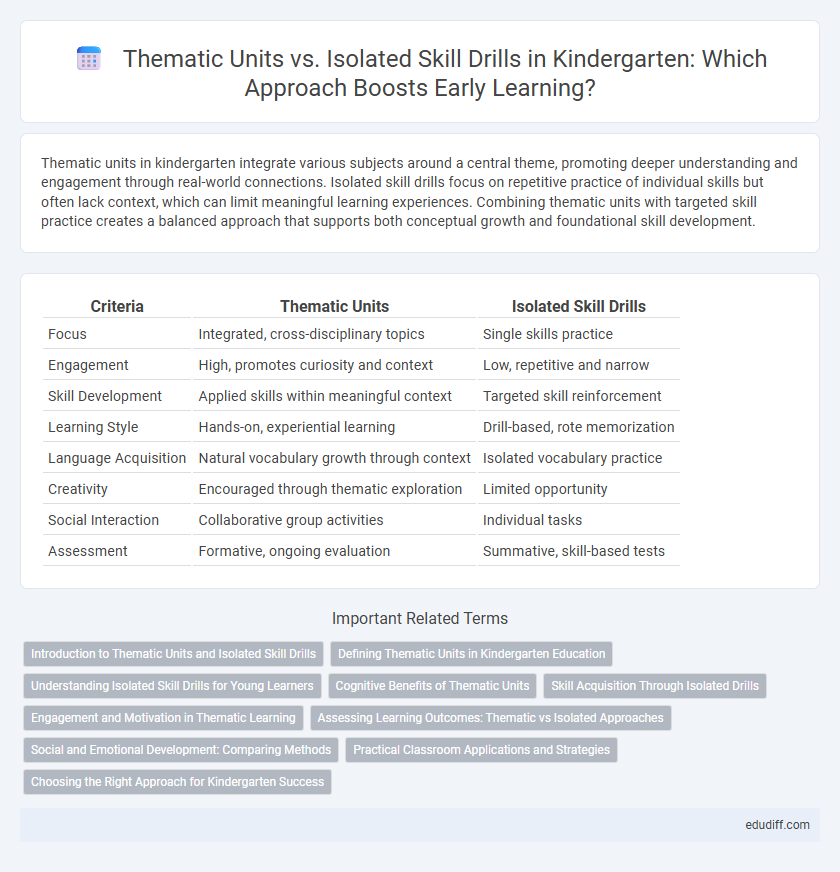Thematic units in kindergarten integrate various subjects around a central theme, promoting deeper understanding and engagement through real-world connections. Isolated skill drills focus on repetitive practice of individual skills but often lack context, which can limit meaningful learning experiences. Combining thematic units with targeted skill practice creates a balanced approach that supports both conceptual growth and foundational skill development.
Table of Comparison
| Criteria | Thematic Units | Isolated Skill Drills |
|---|---|---|
| Focus | Integrated, cross-disciplinary topics | Single skills practice |
| Engagement | High, promotes curiosity and context | Low, repetitive and narrow |
| Skill Development | Applied skills within meaningful context | Targeted skill reinforcement |
| Learning Style | Hands-on, experiential learning | Drill-based, rote memorization |
| Language Acquisition | Natural vocabulary growth through context | Isolated vocabulary practice |
| Creativity | Encouraged through thematic exploration | Limited opportunity |
| Social Interaction | Collaborative group activities | Individual tasks |
| Assessment | Formative, ongoing evaluation | Summative, skill-based tests |
Introduction to Thematic Units and Isolated Skill Drills
Thematic units in kindergarten integrate multiple subject areas around a central theme, promoting deeper understanding and engagement by connecting concepts in meaningful contexts. Isolated skill drills focus on repetitive, discrete practice of individual skills, aiming to reinforce specific abilities such as letter recognition or counting. Introducing thematic units encourages holistic learning and creativity, while isolated drills target precision and mastery of foundational skills.
Defining Thematic Units in Kindergarten Education
Thematic units in kindergarten education integrate multiple subject areas around a central theme, promoting deeper understanding and meaningful connections for young learners. These units enhance cognitive development by linking literacy, math, science, and social studies through hands-on activities and real-world contexts. This holistic approach contrasts with isolated skill drills, which target specific abilities without broader conceptual reinforcement.
Understanding Isolated Skill Drills for Young Learners
Isolated skill drills in kindergarten focus on repetitive practice of specific abilities, such as letter recognition or counting, to reinforce foundational knowledge in young learners. These drills emphasize mastery through targeted exercises, enhancing memory retention and automaticity in essential early academic skills. Research indicates that consistent isolated practice supports neural pathway development crucial for reading and numeracy proficiency during early childhood education.
Cognitive Benefits of Thematic Units
Thematic units foster deeper cognitive connections by integrating multiple subject areas around a central theme, enhancing critical thinking and problem-solving skills in kindergarten children. This approach supports memory retention and comprehension by providing contextual learning experiences that link new knowledge to prior understanding. In contrast, isolated skill drills often limit cognitive engagement to repetitive practice without promoting meaningful content integration or higher-order thinking.
Skill Acquisition Through Isolated Drills
Skill acquisition through isolated drills in kindergarten enhances foundational abilities such as letter recognition, number sequencing, and fine motor skills by providing focused, repetitive practice. This method allows for targeted mastery of specific competencies before integrating them into broader thematic units, ensuring children build confidence and precision. Consistent isolated skill drills contribute to measurable improvements in areas like phonemic awareness and handwriting fluency, critical for early academic success.
Engagement and Motivation in Thematic Learning
Thematic units in kindergarten foster higher engagement and motivation by connecting learning activities to meaningful, real-world contexts that spark curiosity and creativity. Unlike isolated skill drills, thematic learning encourages collaboration, exploration, and sustained interest, making concepts more relevant and memorable for young learners. This holistic approach supports deeper understanding and intrinsic motivation, promoting a joyful and active learning environment.
Assessing Learning Outcomes: Thematic vs Isolated Approaches
Thematic units integrate multiple skills and concepts, enabling holistic assessment of learning outcomes through real-world contexts, whereas isolated skill drills target specific abilities with precise, measurable metrics. In kindergarten education, thematic units promote deeper understanding and critical thinking by connecting knowledge across subjects, leading to more comprehensive evaluations. Isolated skill drills, however, provide clear benchmarks for foundational skills, making it easier to identify individual strengths and areas needing improvement.
Social and Emotional Development: Comparing Methods
Thematic units foster social and emotional development in kindergarten by integrating real-life scenarios that promote empathy, cooperation, and communication within meaningful contexts. In contrast, isolated skill drills often emphasize repetitive practice of specific skills, which may limit opportunities for children to engage in social interactions and emotional exploration. Research shows that thematic approaches enhance children's ability to regulate emotions and build relationships, supporting holistic development more effectively than skill-focused drills.
Practical Classroom Applications and Strategies
Thematic units in kindergarten integrate multiple subjects around a central theme, fostering connections and promoting deeper understanding through practical activities like storytelling, art, and group projects. Isolated skill drills target specific abilities such as letter recognition or counting using repetitive exercises, which can enhance mastery but may lack engagement. Combining thematic units with targeted skill drills maximizes learning by contextualizing skills within meaningful experiences, encouraging active participation and retention.
Choosing the Right Approach for Kindergarten Success
Selecting thematic units in kindergarten promotes holistic learning by integrating multiple skills through engaging, context-rich activities that foster critical thinking and creativity. Isolated skill drills, while beneficial for mastering specific abilities such as letter recognition or counting, often lack the meaningful connections needed for deeper understanding and retention. Balancing thematic units with targeted practice ensures comprehensive development and sustained enthusiasm in early childhood education.
Thematic units vs Isolated skill drills Infographic

 edudiff.com
edudiff.com